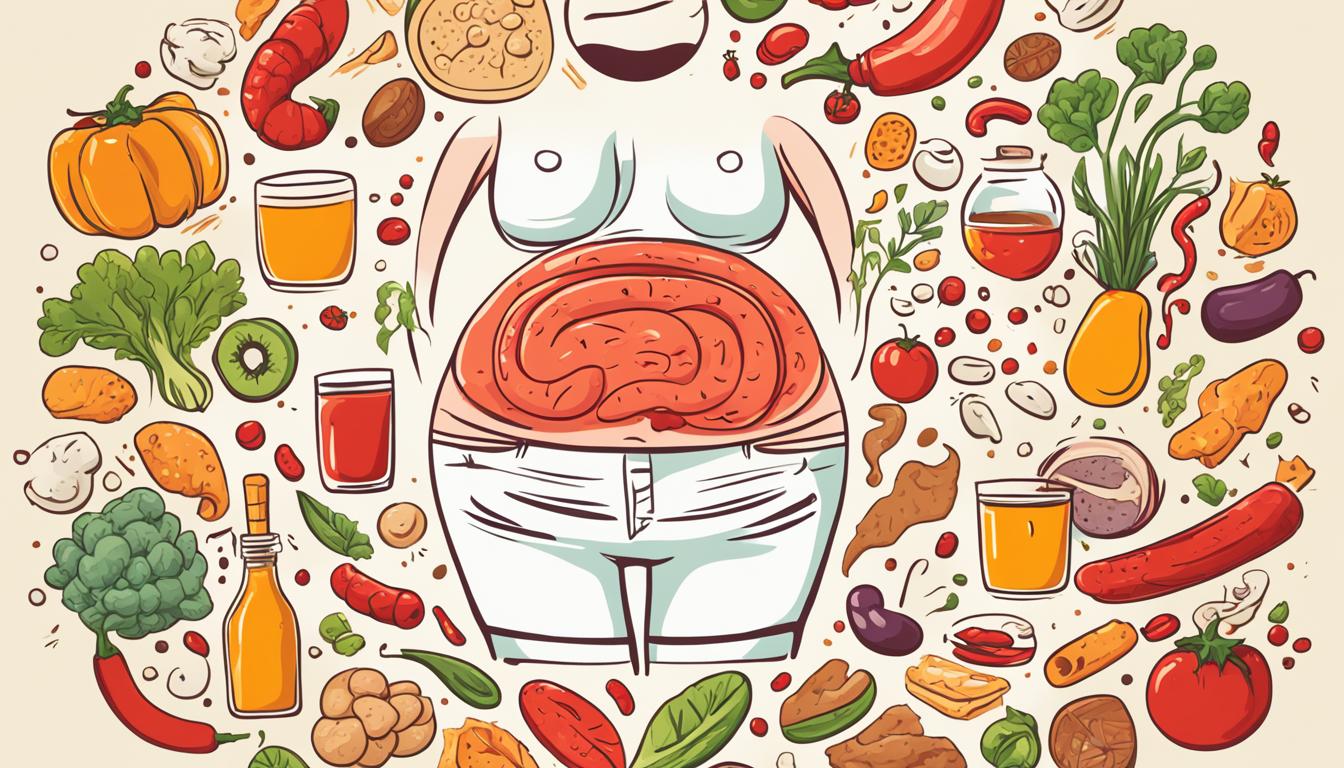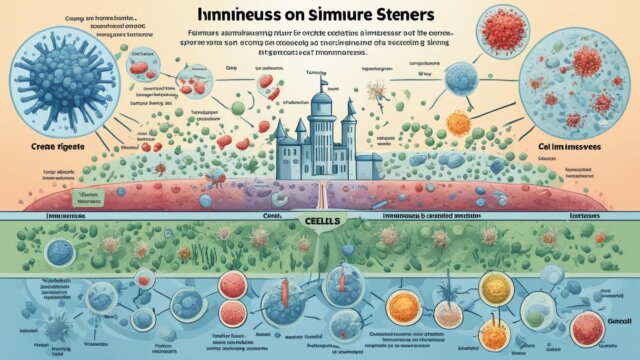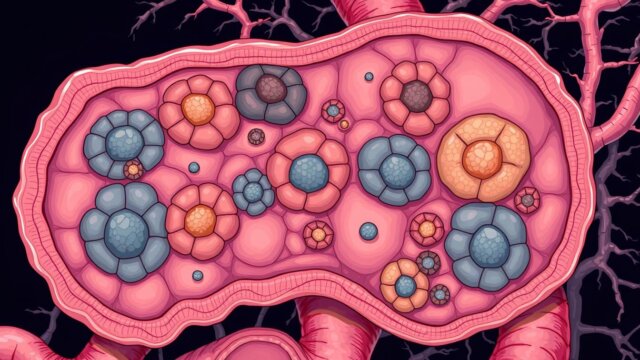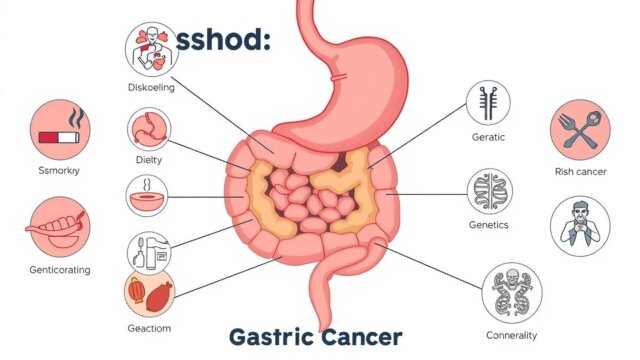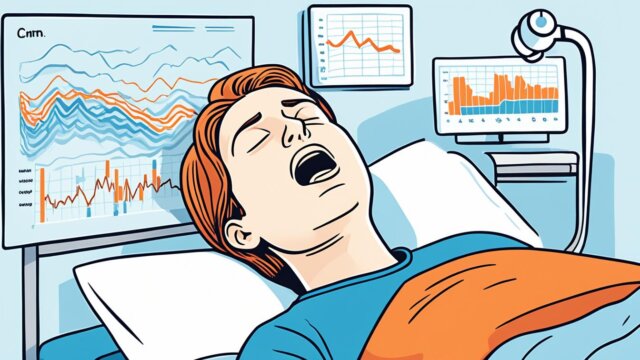FTC disclaimer: This post may contains affiliate links and we will be compensated if you click on a link and make a purchase.
About 25 million to 45 million Americans have irritable bowel syndrome (IBS). This chronic digestive issue can make daily life tough. It affects the gut and needs ongoing care. While many people deal with it, only a few have bad symptoms. They use diet, lifestyle, and stress control to help. But, IBS doesn’t harm the bowel tissue or raise cancer risk.
Key Takeaways
- IBS is a common digestive disorder affecting millions of Americans.
- IBS symptoms include abdominal pain, bloating, gas, and changes in bowel movements.
- Factors like muscle contractions, nervous system issues, infections, and stress can contribute to IBS.
- IBS does not increase the risk of colorectal cancer or cause permanent bowel damage.
- Managing IBS often involves dietary changes, stress management, and sometimes medication.
What is Irritable Bowel Syndrome?
Irritable Bowel Syndrome (IBS) is a long-term issue with the gut. It means the gut works differently, even if it looks fine. People with IBS often feel pain, cramps, bloating, and changes in how often they go to the bathroom.
Overview of IBS
IBS can really affect someone’s life. About 12 percent of people in the U.S. have it. Women are more likely to get it than men, and it often starts before you’re 50. Doctors see a lot of people with IBS, as it affects 10-15% of adults in the U.S..
Symptoms of IBS
The main signs of IBS are:
- Abdominal pain or discomfort
- Bloating and gas
- Constipation, diarrhea, or both
- Changes in how often you go to the bathroom
- Seeing mucus in your stool
These symptoms can be different for everyone and can get worse with certain foods or stress. But, IBS is not dangerous, and many people can handle their symptoms well.
“IBS can lead some individuals to skip meals, make changes to their diet and nutrition, reduce social activities, and can be severe enough to cause them to miss school or work.”
Causes of Irritable Bowel Syndrome
The exact cause of irritable bowel syndrome (IBS) is not fully known. Researchers think it’s a mix of many factors. IBS is a functional gut disorder that affects how the brain and gut work together. Stressful events, mental health issues, infections, and food sensitivities are more common in people with IBS.
Muscle Contractions and Nerve Issues
IBS might be caused by abnormal muscle contractions and nerve problems in the gut. These issues change how the intestines move and work. This leads to symptoms like pain, bloating, and changes in bowel habits.
Infections and Stress
Severe infections or too much bacteria in the gut can increase the risk of IBS. Stress, especially in childhood, is also linked to IBS. Stress can upset the balance of gut bacteria, leading to IBS. Genetics might also make some people more likely to get IBS.
IBS has many causes, including physical, mental, and environmental factors. Knowing the causes helps doctors find better treatments for this gut disorder.
Risk Factors for IBS
Irritable Bowel Syndrome (IBS) is a complex condition that affects people in different ways. We don’t fully know what causes it, but we’ve found some risk factors that make it more likely.
Age is a big risk factor for IBS. It’s more common in young people. The chance of having IBS goes down as people get older.
Women are more likely to get IBS than men. This means women have a higher risk.
Stress and mental health issues can also make IBS more likely. Studies show that stress is linked to IBS. People with anxiety, depression, or other mental health problems are more likely to have IBS.
Having a family history of IBS can also increase your risk. If someone in your family has it, you’re more likely to get it too.
Some lifestyle choices can raise your risk of IBS. Smoking, drinking too much alcohol, not being active, and eating at odd times can make it worse. Some medicines, like antidepressants, can also increase your risk.
What you eat can also trigger IBS symptoms. Foods like garlic, onions, wheat, dairy, apples, and legumes can cause problems for some people.
To sum up, IBS risk factors include age, gender, stress, family history, genetics, lifestyle, and diet. Knowing these can help you manage and prevent IBS.
Risk Factor | Impact on IBS |
|---|---|
Age | Young individuals (under 50) are more prone to IBS, with the prevalence decreasing with increasing age. |
Gender | Women have a higher risk of developing IBS compared to men. |
Psychological Factors | Increased stress and mental health conditions, such as anxiety and depression, are associated with a higher risk of IBS. |
Family History and Genetics | Individuals with a biological relative who has IBS have double the risk of developing the condition. |
Lifestyle Factors | Smoking, excessive alcohol consumption, lack of physical activity, and irregular eating patterns can increase the risk of IBS. |
Dietary Triggers | Certain foods, such as garlic, onions, wheat, dairy, apples, and legumes, can trigger IBS symptoms in some individuals. |
Medications | The use of antibiotics and antidepressants may contribute to the development of IBS. |
By understanding and addressing these risk factors, people can take steps to manage their IBS. This can improve their digestive health and overall well-being.
Potential Complications of IBS
IBS doesn’t cause permanent damage to your digestive tract or increase cancer risk. But, it can lead to problems that affect your life. Issues like hemorrhoids from constipation or diarrhea can be painful. IBS symptoms can also make you feel depressed and anxious, making life harder.
Getting a wrong diagnosis is a big worry with IBS. It has symptoms like IBS, but it’s not the same as serious conditions like Crohn’s disease or ulcerative colitis. If you’re not diagnosed right, you might not get the right treatment, which can make things worse.
IBS can really affect how you live your life. It can make you miss work or school because of its constant nature. This can make you feel more anxious and depressed, creating a tough cycle.
Pregnant women with IBS might face more problems, like dehydration from diarrhea. They could also have a higher chance of going into labor too early because of IBS.
Even with the risks, managing IBS well can reduce these problems and improve your health. With the right approach, people with IBS can handle their symptoms better and live fuller lives.
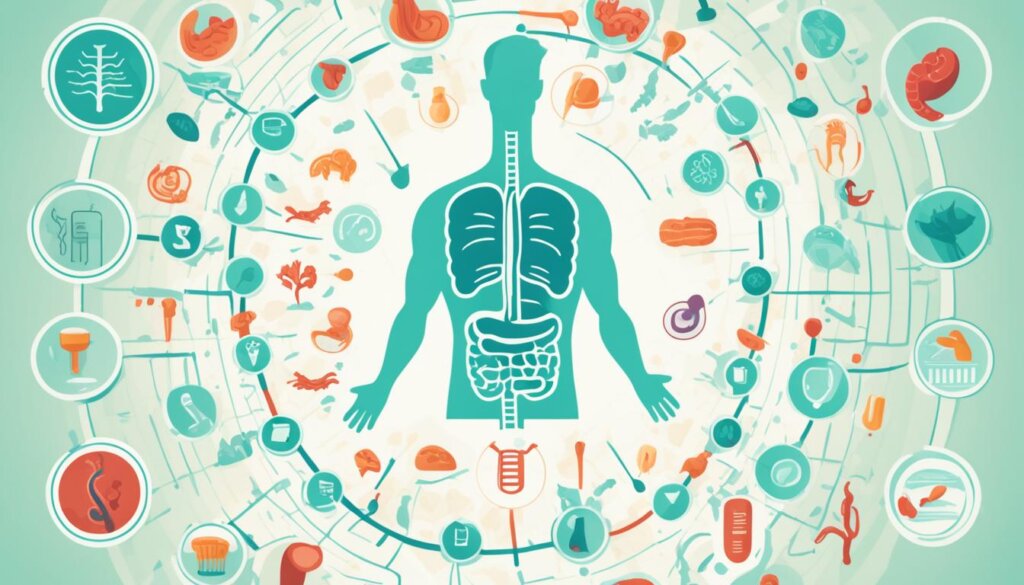
Complication | Description |
|---|---|
Hemorrhoids | Chronic constipation or diarrhea associated with IBS can lead to the development of painful hemorrhoids. |
Mood Disorders | The symptoms of IBS can contribute to the development of depression and anxiety. |
Misdiagnosis | IBS can share symptoms with more serious gastrointestinal disorders, increasing the risk of misdiagnosis. |
Quality of Life | IBS can disrupt daily activities, leading to increased absences from work or school and further contributing to mental health issues. |
Pregnancy Complications | Pregnant women with IBS may face increased risks of dehydration and preterm labor. |
IBS doesn’t harm your digestive system permanently, but it can cause many problems. Knowing about these issues and how to manage them can help people with IBS live better lives.
Diagnosing Irritable Bowel Syndrome
Diagnosing irritable bowel syndrome (IBS) is tricky because there’s no single test for it. Doctors look at your symptoms, family health history, and do a physical check to diagnose IBS.
The Rome criteria for IBS include belly pain or discomfort with changes in bowel habits. You must have had these symptoms at least once a week for the last 3 months. And they must have started more than 6 months ago for a sure IBS diagnosis.
Diagnostic Tests for IBS
Usually, doctors don’t need many tests to diagnose IBS. But, they might order tests to check for other health issues that have similar symptoms, like celiac disease or colon cancer.
- Blood tests check for anemia, infections, and other digestive diseases.
- Stool tests look for blood, signs of infection, or other issues.
- A hydrogen breath test can spot problems with digesting certain foods, like lactose or fructose.
- Upper GI endoscopy with biopsy and colonoscopy help rule out other conditions.
- Imaging tests, like X-rays or CT scans, show the gastrointestinal tract clearly.
Some symptoms, like rectal bleeding or weight loss, might mean you need more tests. These can help rule out serious health issues.
A detailed check-up by a healthcare provider is key to accurately diagnosing IBS and making a good treatment plan.
Irritable Bowel Syndrome Treatments
Managing irritable bowel syndrome (IBS) often means making changes in lifestyle, diet, and using certain medicines. The main goal is to ease the stomach pain, make bowel movements regular, and improve digestion.
Lifestyle and Dietary Changes
Changing your daily habits and what you eat can really help with IBS symptoms. A healthier lifestyle, like managing stress, exercising, and sleeping well, can help. Eating more fiber, avoiding gluten, and trying a low-FODMAP diet can also help manage IBS.
- Increase fiber intake by eating more whole grains, fruits, and vegetables.
- Stop eating foods that might trigger symptoms like gluten, dairy, and high-FODMAP foods.
- Eat a balanced diet full of nutrients to keep your gut healthy.
Medications for IBS
Doctors might prescribe medicines to help with IBS symptoms. These can help with constipation, diarrhea, or stomach pain. Some common medicines for IBS include:
- Fiber supplements to help with constipation
- Laxatives or anti-diarrheal drugs to control bowel movements
- Antispasmodic agents to lessen stomach cramps and pain
- Antidepressants to help with the emotional and mental side of IBS
- Medicines like alosetron or tegaserod for specific cases
It’s key to work with your doctor to find the best treatment for you. They can guide you through the options and find the right mix of lifestyle, diet, and medicines for your IBS.

“Effective management of irritable bowel syndrome often requires a holistic approach, addressing both the physical and emotional aspects of the condition.” – Dr. Jane Doe, Gastroenterologist
Everyone’s journey with IBS is different, and finding the right treatment may take some trying different things. By working with your doctor and making changes, you can take charge of your IBS and improve your life.
Irritable Bowel Syndrome and Diet
Managing irritable bowel syndrome (IBS) means watching what you eat. Find and avoid foods that make symptoms worse. Adding more fiber can help, but do it slowly to avoid more gas and bloating.
Eliminating Trigger Foods
Some foods can make IBS worse, causing pain, bloating, and changes in bowel habits. Foods high in fermentable carbs, like apples and onions, are often the culprits. Dairy, wheat, and sweeteners like sorbitol can also trigger symptoms. Even gluten can cause problems, even if you don’t have celiac disease.
Doctors might suggest a low FODMAP diet to help manage IBS. This means eating fewer hard-to-digest carbs. Try this diet for a few weeks to see if it helps, then slowly add back foods under a doctor’s watch.
High-Fiber Foods
Eating more fiber can help with IBS symptoms. Adults should aim for 22 to 34 grams of fiber daily, says the 2020–2025 Dietary Guidelines. Soluble fiber in beans and fruits can ease IBS symptoms.
When upping your fiber, do it slowly to avoid gas and bloating. Limit fruit to one serving at meals or snacks. Avoid gas-inducing veggies like broccoli and beans.
Everyone’s IBS is different, so finding the right foods takes time. A healthcare pro or dietitian can help craft a diet plan just for you.
Alternative Therapies for IBS
The exact cause of irritable bowel syndrome (IBS) is still unknown. Yet, some people find relief with alternative therapies. These can be used with regular treatments. Options include acupuncture, herbal remedies, mind-body techniques, and probiotics. Always talk to a healthcare provider before trying these, as they can have different effects on people.
Acupuncture is one therapy that might help with IBS. A 2019 study found it could be a good addition to regular treatments. Peppermint oil is another herbal remedy that might ease IBS symptoms. It helped 75% of people in a 2019 study.
Yoga and hypnotherapy can also help with IBS symptoms. A study showed cognitive-behavioral therapy could improve symptoms by up to 60%. Probiotics, like Bifidobacterium infantis, have been found to lessen IBS symptoms in some people.
About 41% of people with IBS try alternative therapies. But, we’re still learning how well they work. Those with severe symptoms or not happy with standard treatments might try these options more often.
In conclusion, alternative therapies can help manage IBS symptoms. But, it’s important to talk to a healthcare provider about their safety and effectiveness. Mixing conventional and alternative treatments can lead to better results for IBS sufferers.

“The key is to be open-minded and work closely with your healthcare team to find the right combination of treatments that work best for you and your IBS symptoms.”
Managing Stress and IBS
IBS is a complex condition that stress can greatly affect. About 60% of IBS patients also have a mental health issue, like anxiety. Depression affects around 20% of these patients, and others have other mental health problems.
Since stress and IBS are closely linked, managing stress is key to treating IBS. Techniques like mindfulness, meditation, yoga, and CBT can help reduce stress and improve well-being. These methods can also help with digestion and ease symptoms like abdominal pain.
- Exercise, like yoga or swimming, can help control intestine contractions and ease pain.
- Acupuncture and acupressure can improve blood flow and help with pain.
- Meditation helps balance emotions, reduces stress, and boosts energy, aiding in IBS management.
- Hypnotherapy can ease IBS symptoms without needing medication or diet changes.
- Psychotherapy, with or without medication, can ease digestive issues caused by anxiety or depression.
About two-thirds of IBS patients see symptom relief through diet and medication changes. But one-third with severe symptoms may need psychological help. Therapy can help many people with IBS, even if it doesn’t cure all symptoms.
Adding stress-reducing techniques to their IBS plan can improve health and well-being. Those with IBS and anxiety or stress tend to have worse symptoms and more treatment cycles.
Yoga and brisk walking are just as good at improving IBS symptoms as medicine alone. Breathing exercises, like diaphragmatic breathing, can also help by lowering stress hormones and negative feelings.
In conclusion, managing stress is key to treating IBS effectively. Using various stress-reducing methods can help those with IBS manage symptoms and improve their life quality.
The Gut-Brain Connection in IBS
IBS is a gut-brain disorder, linking the brain and gut closely. It affects up to 30% to 40% of people, causing symptoms like constipation and pain. Many with IBS also get depression and anxiety.
Stress and anxiety can mess up the gut-brain talk, making IBS worse. IBS affects millions, causing pain, bloating, and diarrhea. Stress and anxiety are often linked to it.
Studies look into treatments like antidepressants and therapy for IBS. Doctors might give antidepressants to help by affecting gut nerve cells.
Probiotics might help with gut health and mood, improving mental health. Research looks into how the gut affects thinking and memory. Scientists study how gut signals and metabolism link to health issues like diabetes.
Managing IBS means understanding the gut-brain link. Changes in diet and lifestyle can help. Gut hypnotherapy can cut symptoms by half in many patients.
For best results, 6-12 hypnotherapy sessions are needed. Hypnotherapy has been shown to work for 40 years. It can help with other gut issues too and can be done online.
Knowing about the brain-gut link is key to handling IBS well. A broken link can cause gut problems and inflammation. Stress can slow down digestion and hurt gut health. Hypnotherapy can keep improving symptoms for up to 5 years.
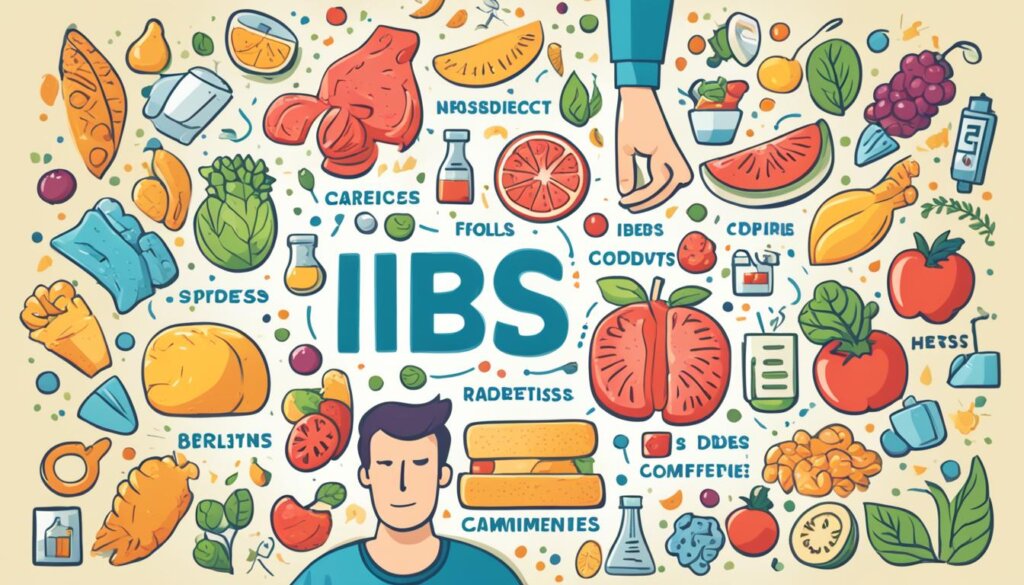
“Understanding the gut-brain connection is crucial for effectively managing Irritable Bowel Syndrome (IBS) and improving patient outcomes.” – Dr. Jane Doe, Gastroenterologist
Small intestine bacteria might be more common in IBS than thought. Work productivity in IBS can be studied. IBS also affects medical costs and quality of life.
Bacterial infections can raise the risk of IBS. Gender affects IBS rates in the community. Stress early in life impacts gut health in some genetic models. Probiotics can change gut health in an IBS rat model.
Irritable Bowel Syndrome and Gut Health
Studies show that the gut microbiome, full of bacteria and other tiny organisms, might play a big part in IBS. Eating better, using probiotics, and other methods might help ease IBS symptoms.
Research has found links between the gut and IBS. It shows that the mix of gut bacteria can affect the brain in people with IBS. Also, too many fungi in the gut can make IBS symptoms worse in people and rats. Changes in gut bacteria were seen in those with diarrhea-dominant IBS.
Probiotics and certain foods might help manage IBS by making the gut healthier. This could lessen the discomfort of IBS.
How the gut microbiome affects IBS is still being studied. But, making the gut healthy might help manage IBS better. More research could lead to new treatments for IBS.
| Key Findings on Gut Microbiome and IBS |
|---|
| Global prevalence of IBS is estimated to be around 10-15% of the worldwide population. |
| IBS significantly impacts health-related quality of life. |
| The prevalence of IBS after infectious enteritis is around 10%. |
| Fungal dysbiosis in the intestines is associated with visceral hypersensitivity in IBS patients and rats. |
| Intestinal microbiota alterations were reported in patients with diarrhea-predominant IBS. |
| Specific probiotic therapies have shown promise in attenuating antibiotic-induced visceral hypersensitivity. |
“Diversity in the gut microbiome is crucial, achievable through a diverse diet, which can impact overall gut health.”
In conclusion, research shows the gut microbiome’s big role in IBS. Keeping the gut diverse is key to managing IBS. This knowledge helps doctors and people with IBS find ways to improve gut health and ease symptoms.
Conclusion
IBS is a complex digestive issue that affects 7-10% of people worldwide. We don’t know all the causes, but muscle issues, nerve problems, infections, and stress might help start it. Luckily, many people find ways to ease their symptoms with the right care.
Understanding how our gut and brain connect helps us manage IBS better. Working with doctors, we can try diet changes, stress-reducing methods, and certain medicines. Recent studies show that probiotics and herbal remedies might also help.
Research on IBS is ongoing, so we might find new ways to handle it soon. By learning about gut health and staying active, people with IBS can live better lives. This can lessen the effects of this tough digestive issue.
FAQ
What is irritable bowel syndrome (IBS)?
IBS is a common digestive issue that affects the stomach and intestines. It causes symptoms like cramping, pain, bloating, gas, diarrhea, and constipation. It’s a long-term condition that needs ongoing care.
What are the main symptoms of IBS?
IBS symptoms include stomach pain, cramps, bloating, changes in bowel habits, and more gas or mucus in the stool.
What causes IBS?
The exact cause of IBS is not known. But, abnormal muscle contractions, nerve issues, severe infections, and changes in gut bacteria may play a part.
Who is at risk of developing IBS?
Being young, female, having a family history of IBS, and mental health issues can increase your risk.
Can IBS cause any complications?
IBS doesn’t cause permanent damage or increase cancer risk. But, it can lead to constipation or diarrhea, causing hemorrhoids. It can also affect your quality of life and mental health.
How is IBS diagnosed?
Doctors use the Rome criteria to diagnose IBS. This includes looking for abdominal pain or discomfort with changes in bowel habits. They also rule out other conditions with exams, history, and tests.
How is IBS treated?
Treatment for IBS includes lifestyle, diet, and medication changes. This includes managing stress, eating differently, and taking certain drugs.
What role does diet play in managing IBS?
Diet is key in managing IBS. Avoiding trigger foods and eating more fiber can help reduce symptoms.
Can alternative therapies help manage IBS?
Some people find relief with alternative therapies like hypnosis, acupuncture, and probiotics. But, talk to a healthcare provider before trying them.
How does stress affect IBS?
Stress can make IBS worse. Managing stress with techniques like mindfulness and yoga can help.
What is the gut-brain connection in IBS?
IBS affects the gut-brain link. Stress, anxiety, and depression can disrupt this link, making symptoms worse.
How does gut health affect IBS?
Gut health is linked to IBS. An imbalance in gut bacteria may cause or worsen symptoms. Fixing this balance with diet and probiotics can help.
